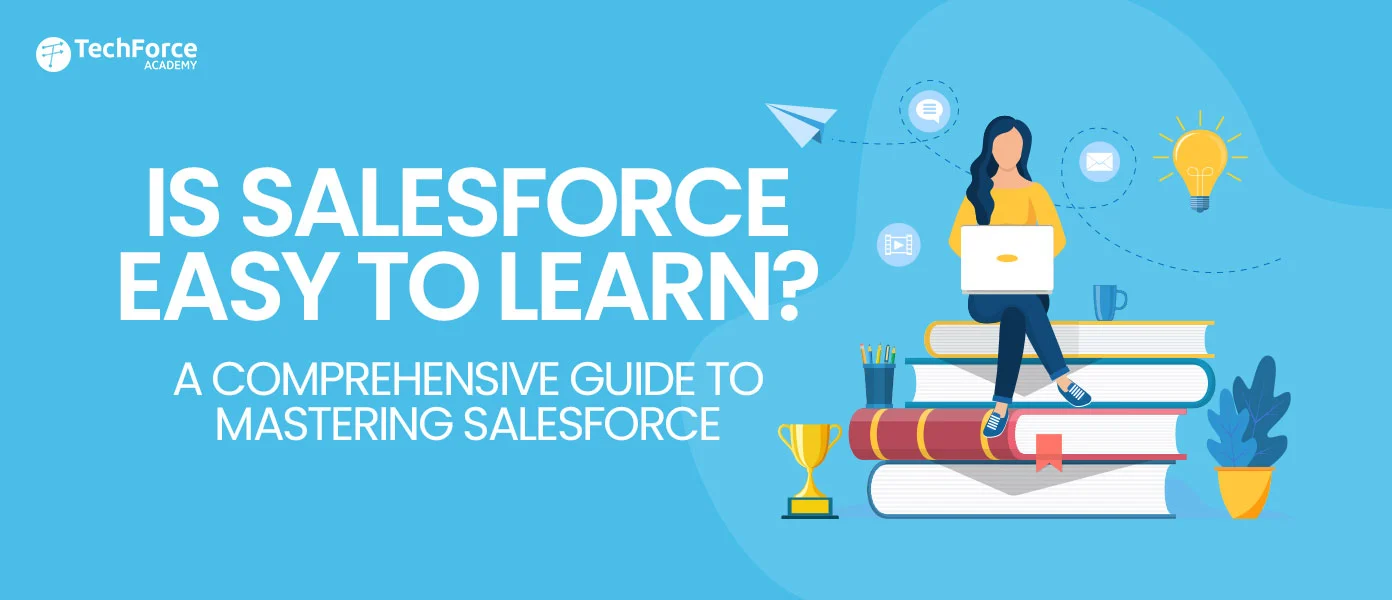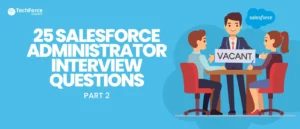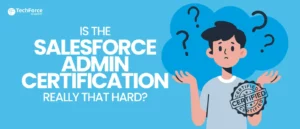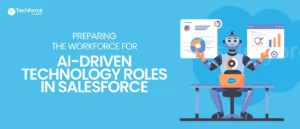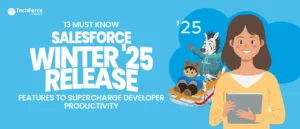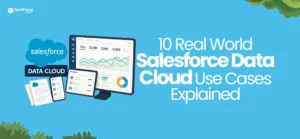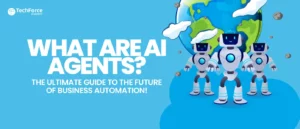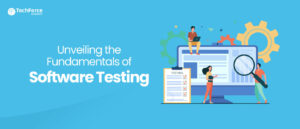Salesforce stands tall as a leader in the Customer Relationship Management (CRM) software landscape. With the help of this user-friendly, cloud-based platform, businesses can effectively handle customer interactions, streamline sales pipelines, and obtain insightful customer data. But with its wide range of functionalities, a common question arises: is Salesforce easy to learn?
Like most things, there is not a simple yes or no answer.
Beginners may easily navigate Salesforce because of its user-friendly interface and abundance of Salesforce education materials. But mastering its full potential calls for perseverance, exploration, and a dedication to lifelong learning.
With the help of this comprehensive guide, you will have an actual grasp of learning Salesforce, from mastering the fundamentals to becoming an experienced user.
Is Salesforce Easy to Learn? A Spectrum of Difficulty
Salesforce has many features, ranging from simple contact management to complex automation and app development. Learning it varies depending on the particular area you wish to become an expert in. Here’s a breakdown:
Salesforce User
This is the easiest entry point. There is minimum technical knowledge required to understand the interface, navigate features like leads and opportunities, and generate reports. Most users can learn the skills they need with practice and easily accessible materials.
Salesforce Administrator
Taking the user experience a step further, admins manage user permissions, customise layouts, and automate workflows. This role requires a deeper understanding of the platform and comfort with configuration tools. However, Salesforce provides excellent learning resources and certifications to bridge the gap.
Salesforce Developer
This is where things get more technical. Developers build custom applications, integrate with external systems, and leverage programming languages like Apex and Visualforce. Prior coding experience is a plus, but Salesforce offers resources specifically designed to equip users with the necessary skills.
The Salesforce Learning Path
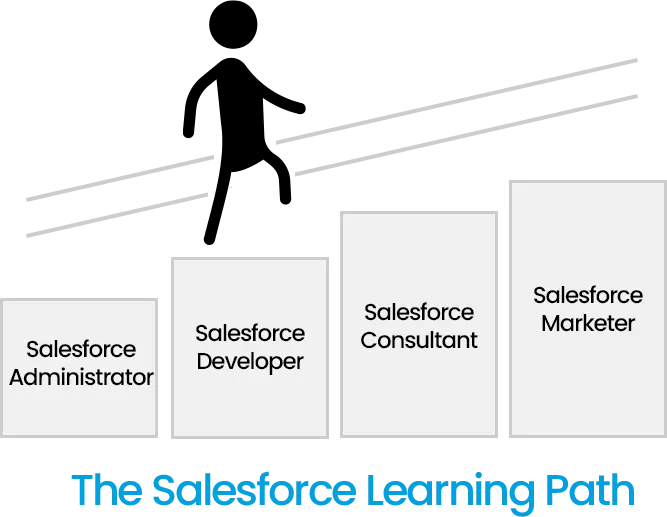
Salesforce provides various learning pathways tailored to different roles and expertise levels. Here are some common learning paths:
- Salesforce Administrator: Focuses on managing Salesforce applications, including user management, security, data management, and customisation.
- Salesforce Developer: Involves creating custom applications using Apex, Visualforce, and Lightning components.
- Salesforce Consultant: Specialises in implementing Salesforce solutions for clients, requiring a deep understanding of business processes and Salesforce capabilities.
- Salesforce Marketer: Concentrates on using Salesforce Marketing Cloud for campaign management, automation, and analytics.
Deep Dives and Advanced Learning: Expanding Your Expertise
Once you’ve established a solid foundation in Salesforce, you can delve into more advanced functionalities and explore customisation options:
- Salesforce AppExchange: The AppExchange is a marketplace overflowing with pre-built applications that extend the capabilities of Salesforce. These applications cater to various industry-specific needs and can significantly enhance your Salesforce experience.
- Salesforce DX (Developer Experience): For those with programming expertise, Salesforce DX provides a robust set of tools for building custom applications and integrations on the Salesforce platform. Learning Salesforce DX allows you to tailor the platform to your specific business needs.
- Salesforce Heroku: Heroku is a cloud platform acquired by Salesforce, allowing developers to build and deploy modern web applications. While not essential for all users, Heroku integration with Salesforce opens doors for advanced customisation and unique application development.
Beyond these specific areas, here are some additional considerations for expanding your Salesforce knowledge:
- Data Management in Salesforce: Salesforce is a powerful data management tool. Learning how to effectively manage and utilise customer data is crucial for maximising the platform’s potential. This includes understanding data security best practices, data cleansing techniques, and reporting functionalities.
- Automation with Salesforce Workflows and Process Builder: Automation is a cornerstone of Salesforce. Learning to automate workflows and processes using tools like Workflow Builder and Process Builder can significantly boost efficiency and streamline repetitive tasks.
- Salesforce Reports and Dashboards: Salesforce offers robust reporting and dashboarding capabilities. Learning to create insightful reports and dashboards allows you to track key performance indicators (KPIs), identify trends, and make data-driven decisions.
Demystifying the Learning Curve: Is Salesforce Hard to Learn?
- CRM Experience: If you’ve used other CRM platforms, you’ll have a head start in understanding core CRM concepts like lead management, opportunity tracking, and customer service ticketing. However, specific functionalities and terminology within Salesforce might still require some familiarisation.
- Technical Background: A basic understanding of technology can be helpful, especially if you plan to delve into automation or customisation aspects of Salesforce. However, Salesforce offers a user-friendly interface, and many core functionalities are designed for users of all technical backgrounds.
- Role-Specific Learning: Different roles within an organisation may require different levels of Salesforce knowledge. For instance, a sales representative may only need to understand basic CRM functions, while a developer might need in-depth knowledge of Apex, Salesforce’s proprietary programming language.
Practical Tips for Salesforce Learning
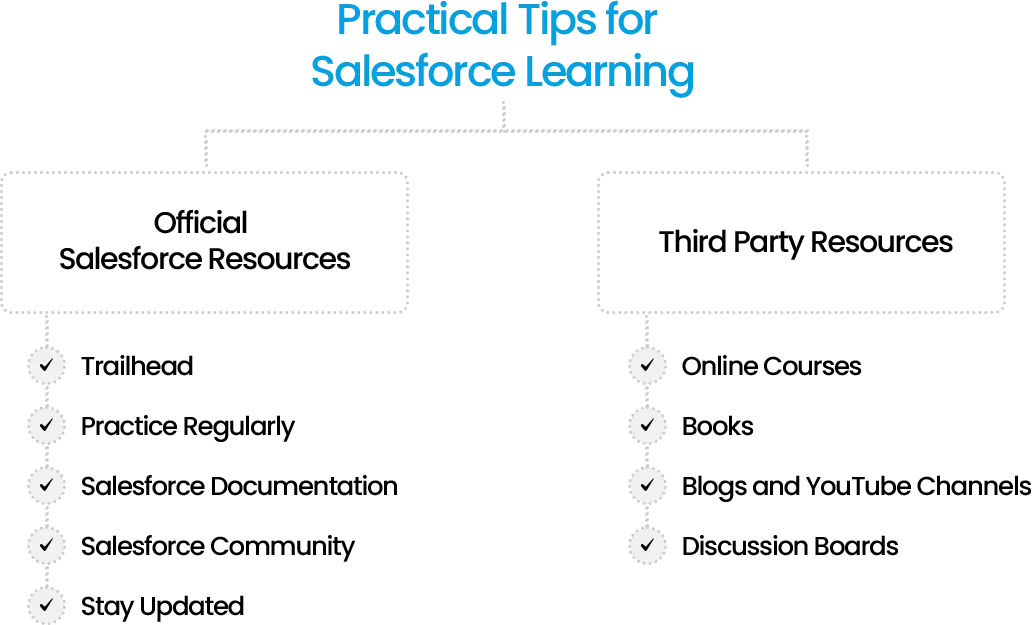
Set Clear Goals and define what you want to achieve with Salesforce. Whether it’s becoming a certified administrator, developing custom applications, or implementing Salesforce for a business, having clear goals will guide your learning journey.
Official Salesforce Resources
- Trailhead: Trailhead, Salesforce’s free, interactive learning platform, is the best way to learn Salesforce. It is an excellent starting point for beginners. It offers a variety of modules and trails covering different aspects of Salesforce. Trailhead uses a gamified approach, allowing learners to earn badges and points as they progress.
- Practice Regularly: Consistent practice is crucial for mastering Salesforce. Use Salesforce’s free Developer Edition to experiment with different features and build custom applications.
- Salesforce Documentation: Comprehensive guides and reference materials provided by Salesforce. It includes user guides, developer guides, and release notes.
- Salesforce Community: Salesforce’s official community where users can ask questions, share knowledge, and collaborate on solutions.
- Stay Updated: Salesforce updates its platform with new features and enhancements regularly. Keep up with the latest releases and trends by following Salesforce blogs, attending webinars, and participating in events like Dreamforce.
Third-Party Resources
- Online Courses: Platforms like LinkedIn Learning and TechForce Academy offer courses on various Salesforce topics, from beginner to advanced levels.
- Books: There are numerous books available on Salesforce, covering topics such as administration, development, and best practices. Notable titles include “Salesforce for Dummies” and “Learning Salesforce Development with Apex.”
- Blogs and YouTube Channels: Many Salesforce experts share their knowledge through blogs and video tutorials. These can provide practical insights and tips for understanding Salesforce.
- Discussion Boards: A forum like XLinTech where users may exchange ideas, ask questions, and work together to find answers.
Salesforce Certification Programs
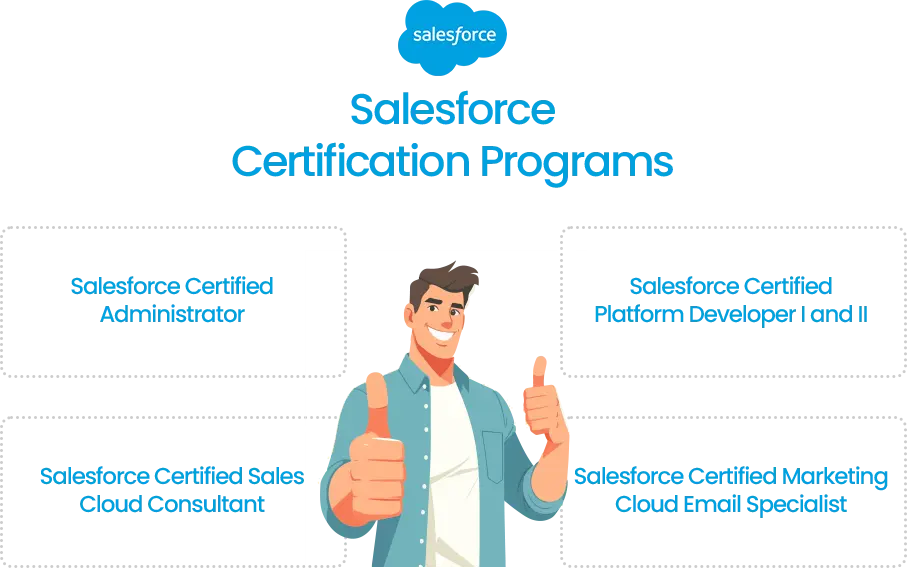
Salesforce offers a range of certification programs that validate your skills and knowledge. Some popular certifications include:
- Salesforce Certified Administrator: Validates your ability to configure and manage Salesforce applications.
- Salesforce Certified Platform Developer I and II: Recognises your proficiency in building custom applications on the Salesforce platform.
- Salesforce Certified Sales Cloud Consultant: Demonstrates your expertise in implementing Sales Cloud solutions.
- Salesforce Certified Marketing Cloud Email Specialist: Certifies your skills in email marketing using Salesforce Marketing Cloud.
Challenges and How to Overcome Them
Complexity and Breadth of Features
Challenge: The vast array of options offered in Salesforce could be disconcerting to new users.
Solution: Make learning the key components your top priority to conquer this challenge. Learn the basics of CRM before managing contacts, accounts, and opportunities. Study more complex options and customisation possibilities once you have a solid understanding of these fundamental concepts.
Technical Skills Requirement
Challenge: Certain roles, such as Salesforce developers, require technical skills like programming and database management.
Solution: Consider starting with non-technical roles like Salesforce administration. As you become more comfortable with the platform, you can gradually acquire the necessary technical skills through courses and practice.
Keeping Up with Updates
Challenge: Staying up to date with Salesforce’s periodic releases of upgrades and new features can be difficult.
Solution: To stay updated, connect with Salesforce through blogs, official channels, and user groups. Attend training sessions on Salesforce and review release notes on a regular basis.
Balancing Theory and Practice
Challenge: While theoretical knowledge is essential, practical experience is equally important for Salesforce mastery.
Solution: You can learn in a balanced way by putting theoretical concepts into practice. Benefit from Trailhead’s hands-on activities, work on real-life projects and try out updates in a Developer Edition environment.
The Rewards of Mastering Salesforce
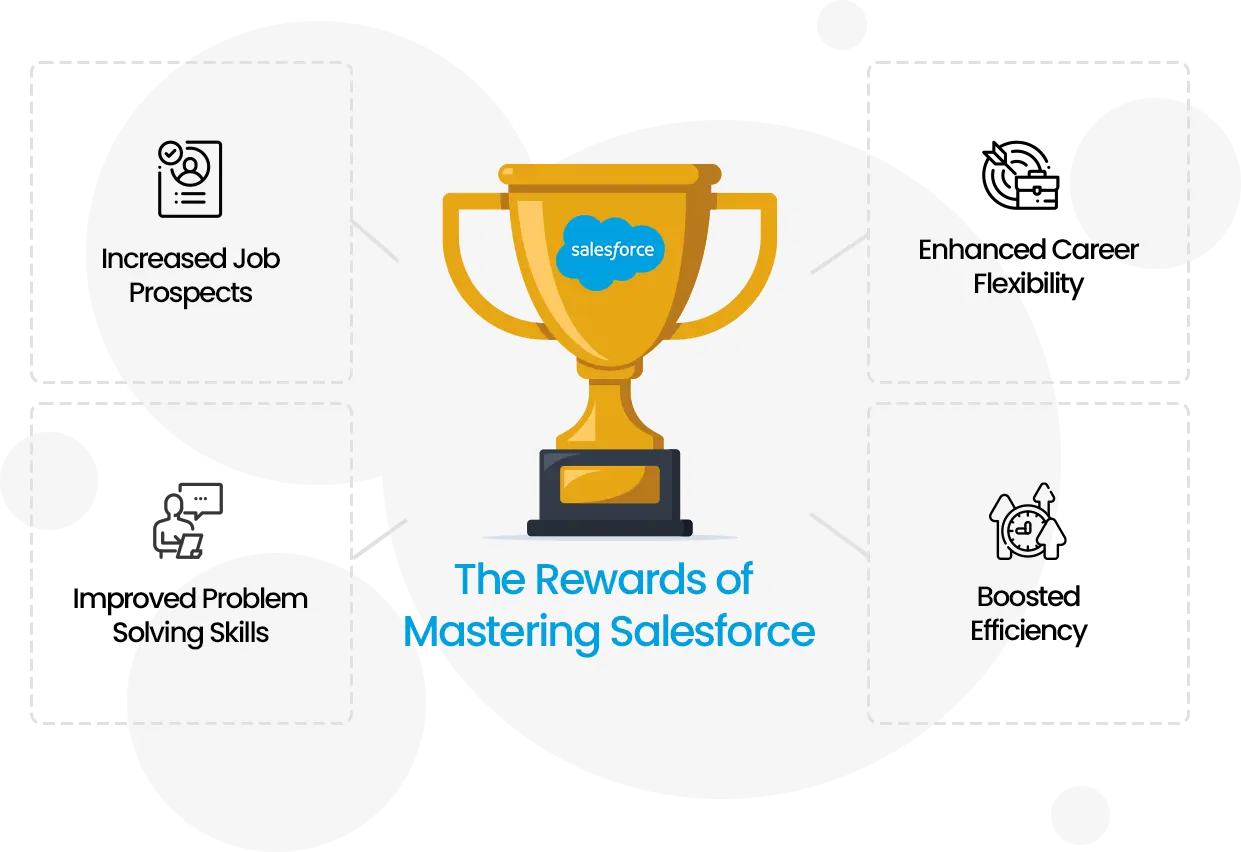
Investing time in Salesforce education can be incredibly rewarding. Here are the benefits of learning Salesforce:
Increased Job Prospects
There is a high need for Salesforce expertise across all industries. Getting certified will boost your eligibility for employment as a CRM administrator and developer.
Enhanced Career Flexibility
Salesforce expertise opens doors to remote work opportunities and allows you to specialise in specific areas like marketing automation or data analysis.
Improved Problem-Solving Skills
Salesforce training teaches you to approach business challenges from a data-driven perspective and develop creative solutions using automation and customisation.
Boosted Efficiency
By optimising workflows, automating procedures, and learning relevant information about your clients, knowing Salesforce lets you increase productivity.
Conclusion: Your Salesforce Journey Awaits
So, is Salesforce easy to learn? Well, mastering Salesforce does take commitment and work, but you can do it with the right resources, strategy, and community support. Start with Trailhead, explore your area of interest, leverage the Salesforce community for support, and continuously expand your knowledge. You can use Salesforce to its fullest potential and propel your business to new heights with commitment.
Remember, the key is to start, stay curious, and embrace the ever-evolving world of Salesforce!

